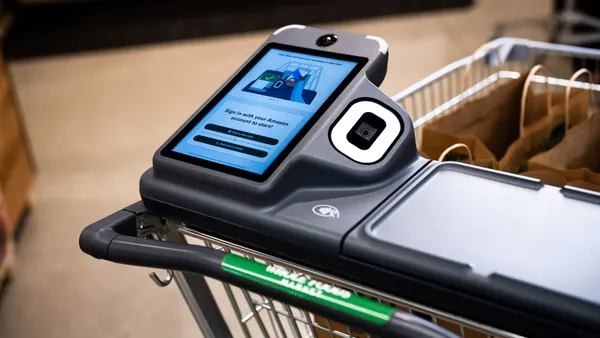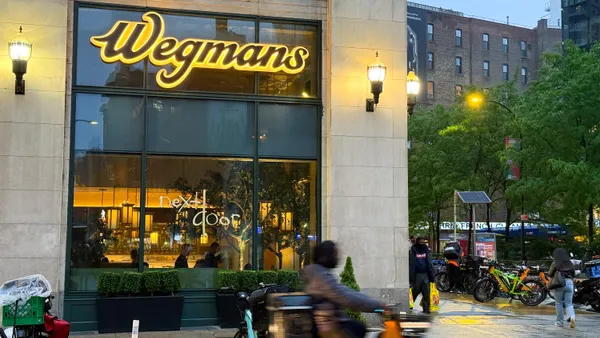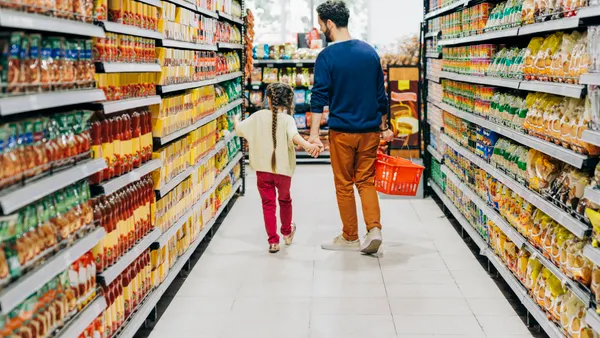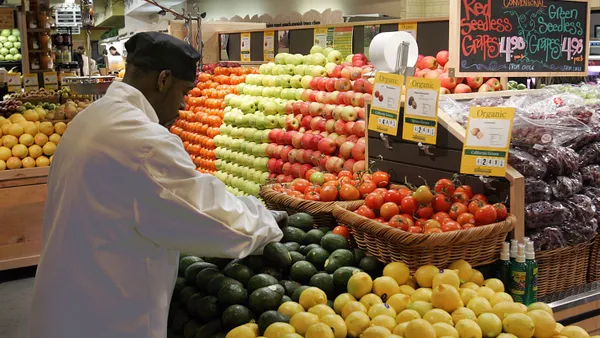Dive Brief:
- Albertsons announced it has forged a strategic partnership with Takeoff Technologies focused on further developing micro-fulfillment technology, according to press release. The partnership includes the formation of dedicated teams that will collaborate on micro fulfillment and “to drive the future of e-commerce order fulfillment.”
- Albertsons says it will purchase additional micro-fulfillment centers (MFCs) from Takeoff. The companies opened an MFC in October at a Safeway in South San Francisco, and plan to open an additional center at a Safeway location in San Jose, California by the end of this year.
- According to Takeoff, micro-fulfillment centers typically hold 15,000 to 18,000 items and can increase productivity tenfold. The company is also running MFCs in partnership with Wakefern in New Jersey, Stop & Shop in Connecticut and Sedano’s in Florida.
Dive Insight:
As micro-fulfillment continues to update and garner attention from the industry, Albertsons wants to position itself at the cutting edge of the order-picking technology.
And that technology is evolving quickly, with retailers testing micro warehouses as more vendors enter the space and develop new models. Meijer recently announced it's piloting an MFC. Takeoff earlier this year built its first standalone facility and also announced its building a "version 2.0" fulfillment center that will process orders faster and store more products.
“The micro-fulfillment center model is a key element in the store of the future,” Vivek Sankaran, Albertsons' president and CEO said in a statement. “It combines the efficiency of automation with the ease of meeting customers when and how they want to shop. In working with Takeoff, we can evolve how the MFC ties into our store and e-commerce ecosystems and accelerate our path to best serve our customers.”
Although details on the collaboration are sparse at this point, it will presumably allow both companies to learn from each other as they navigate e-commerce fulfillment. Albertsons is fighting to keep pace with Amazon, Walmart and Target while also managing a considerable debt load. The company currently offers delivery services nationwide and click-and-collect at a few hundred stores.
In an interview with Grocery Dive last year, Narayan Iyengar, Albertsons’ senior vice president of digital and e-commerce, said micro-fulfillment presents a “happy medium” between the store-pick model and the centralized fulfillment model.
“It leverages the store infrastructure, uses the supply chain feeding into stores and is close enough to our customers that we can get same-day delivery to them,” he said. “We can use last-mile partners as needed, and we get a lot of flexibility in doing that.”
Experts have lined up behind micro-fulfillment. Financial firm Jefferies says the sites, which take around three months to build, can be profitable in as little as a year and are "superior" to other fulfillment models. The firm has been critical of the centralized fulfillment model, notably Kroger’s partnership with Ocado, noting the automated centers the companies are constructing take too long to build and are too expensive.
But micro-fulfillment does have its limitations, Jefferies noted. Robots aren’t able to pick the entire store assortment, including fresh produce, leaving some items to still be selected by hand. This, however, hasn't slowed down Takeoff's plans to expand. Takeoff announced earlier this year it would build 50 MFCs alongside Knapp, the warehouse technology firm that builds the robotics for each center.
Several firms are jockeying with Takeoff to land micro-fulfillment contracts with retailers, including Dematic, Fabric, Alert Innovations and Autostore. In a recent interview with Grocery Dive, Fabric chief commercial officer Steve Hornyak said he estimates grocers will spend roughly $100 billion on micro-fulfillment technology over the next five years.











